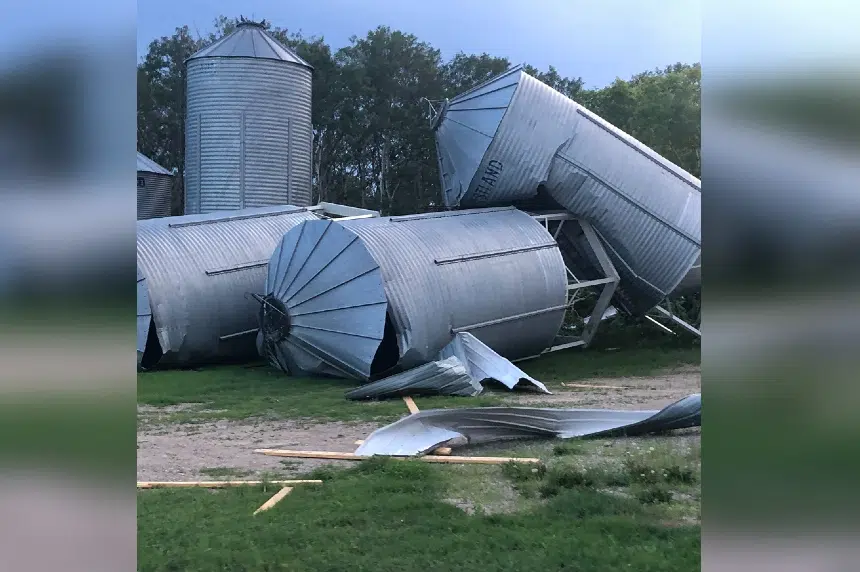Harvest is well underway in some areas of Saskatchewan and is just beginning in others.
For some farmers, it has been challenging just getting to this point.
Steven Donald is a farmer near Moosomin. Not only have hail and flooding decimated his crops, but a few massive storms destroyed some of his farm in July.

Some of the destruction on Steven Donald’s farm near Moosomin in July 2022. (Steven Donald/Submitted)
“Our yard and our crops were hit by a tornado in the middle of July,” he said. “That storm that came through here went through our crops too; they really got knocked down flat.
“(We) definitely have got to learn what insurance companies are like to work with.”
Donald says the abysmal weather pattern is unlike anything he has seen in his region in at least 30 years.
The 43-year-old farmer says the conditions have had a significant impact on his mental health as well.
“Everything’s always a challenge on the farm,” he said. “I can say for myself, the most challenging thing I’ve actually faced this year because of the situations is my mental well-being.”
After all the intense conditions his region has endured, he believes around only 20 per cent of his crops are salvageable.
“There is still a crop there to harvest, but there’s a lot of damaged areas where there’s no crop,” Donald said.
Despite Mother Nature’s brutality this summer, Donald says he is rolling with the punches.
“It’s the emotional roller coaster of trying to fight to get the crop in the ground. We fought to keep it there and we’re fighting to still keep it there,” he said. “I just hope that we don’t have the same fight getting it off.
“We’ve had enough of stress through the year. I’m hoping that the harvest coming up here will be easy.”
Grasshoppers among the other issues
It’s not just storms that are causing grief for producers throughout Saskatchewan. Drought is being felt in some regions of the province, especially in the southwest.
Grasshoppers are also particularly bad.
Bev Pirio, who farms near Radville, says even though the pesky insects aren’t as bad as last year, they’re still very noticeable.
“We’d really hoped that coming out of the drought this year that it would be enough to just shut the grasshoppers down,” she said. “But they just keep on keeping on.
“Right now as the crops ripen, (the pests) are just moving from field to field. They’re moving out of the dry stuff and into the stuff with a bit of green still on it.”
Pirio says it’s staggering how many grasshoppers she will come across comparatively across the region.
“If you go for a drive across the province, you will hit areas where the front of your vehicle is smeared and you can barely see out of it,” she said. “Five miles later, you won’t hit a grasshopper.
“There are very hot pockets of them this year compared to just being a blanket in the area. Where those pockets are, it’s disturbing. It’s horrible.”
In order to eliminate the problem, Pirio says farmers are taking an aggressive approach unlike anything they’ve done before.
“The amount of money spent on pesticide control is the highest we’ve ever used,” she said. “It’s the most spray we’ve ever done for grasshoppers and that was just to save the crop because the prices are good, so you want every bushel you can get out of them.
“Hopefully it works itself out. You spend more money on chemicals and then hope you get the return in the markets when you sell the grain.”
Aside from the fight with insects, Pirio says they have a great crop this year and have already started harvesting.
According to the latest crop report from the province, most of the province has not started harvest operations with overall progress being at one per cent as producers in the southwest and west-central regions get their harvesting operations in full swing.
“This is slightly behind the five-year average (2017-2021) of two per cent,” the report read. “At this time in 2021, the provincial harvest progress was seven per cent, illustrating just how different the growing conditions have been in the province between this year and last.”
As Donald and Pirio prepare for the final stretch of the summer, they’re hopeful there will be more distractions.
“Weather permitting, it should take us three to four weeks,” Pirio said. “We’re blessed.”







